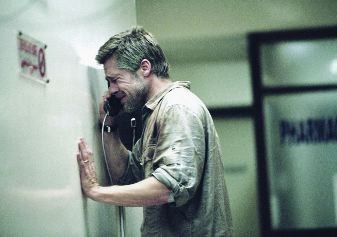Hours of Babel

The acclaimed Mexican filmmaker Alejandro González Iñárritu strings together four stories from around the globe in Babel. It’s an effort to show an interconnected world marked by divisions, alienation and suspicion—the curse of Babel. In the Moroccan countryside, two brothers entrusted with their father’s sheep on a hillside are given a rifle to shoot jackals; fascinated by the trajectory of the bullets, they try out the rifle on a passing bus on the road below and unintentionally hit an American tourist (Cate Blanchett), who is traveling with her husband (Brad Pitt). She fights for her life in a tiny backwater village while the local police, stung into action by accusations of terrorism and threats of an international incident, brutalize the innocent man (Abdelkader Bara) who sold the shepherds the rifle.
The rifle, we learn, was a gift from a Japanese hunter who hired the man as a safari guide. The Japanese part of the story focuses not on the hunter but on his teenage deaf-mute daughter (Rinko Kikuchi), whose experience of social ostracism and grief over her mother’s death drive her to throw herself at a series of men.
The final story involves the tourists’ nanny (Adriana Barraza), back in San Diego, who has been left in charge of their two young children. When the shooting prevents the couple from returning home as planned, the nanny has no choice but to stay with the kids, even though she’s supposed to attend her son’s wedding in Mexico. Unable to find anyone to babysit, she takes the children with her.
On their way back late at night, the driver, her hot-headed nephew (Gael García Bernal), gets into a wrangle with the border police and tears into California with the police in pursuit. All four wind up as fugitives in the desert.
Babel suffers from the same problem as last year’s Oscar-winner Crash, another film about the divide between humans. In both cases the argument is rigged—the plot is so implausible that we can’t, or shouldn’t, accept the movie’s point of view.
To gather evidence for its vision of racial tension, Crash has to arrange for its characters to behave, one after another, in overblown, hysterical ways that defy our experience. In Babel, Iñárritu and his writer, Guillermo Arriaga, string together a wildly improbable coincidence of horrors. By the time the local veterinarian (the closest the tourists can find to a doctor) is stitching up Blanchett’s neck without an anesthetic (don’t vets stock painkillers?), or the distraught Mexican caregiver is trekking through the desert with her two juvenile charges, or the Japanese teen is presenting herself naked to the police detective investigating her father’s link to the rifle, you’re ready to cry uncle. And the unrelieved unpleasantness of this two-and-a-half-hour movie—which descends to the frankly lurid—doesn’t imbue it with seriousness of purpose.
The movie is beautifully shot by Rodrigo Prieto, and Blanchett is such a fine actress that she can make even her character’s physical suffering, which drags on in scene after scene, compelling. She’s remarkable in the scenes before the shooting too. The bitterness in the marriage—her husband has taken her on vacation to try to salvage the union—marks her face and body like a pox.
But there is a problem with Iñárritu’s peculiar brand of grim fatalism. Even his best picture, Amores Perros (2000), a depiction of poverty in modern-day Mexico, lacks a tone (anger, irony, sadness) and a point of view. You can’t figure out what he wants you to think about all the ugliness. His movies are a form of bullying: they make you feel that you’re callous and insensitive if they don’t get to you. Well, Babel gets to you; it contains enough misery for a movie twice its length. Even dressed up in art-house finery, melodrama is still melodrama.




